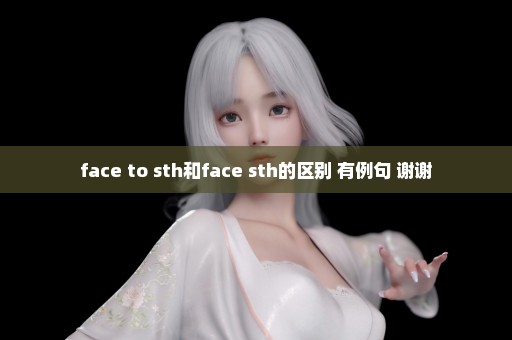face to sth和face sth的区别 有例句 谢谢
"face to sth" 和 "face sth" 的主要区别是前者通常表示朝着某个方向或朝着某一物体等进行面对,而后者则表示面对某件具体的事情或现象。
下面是一些例句来更好地帮助区分两个短语的用法:
- She turned to face the sun. (她转身面向太阳。)
- The house faces out to the sea. (这座房子面朝大海。)
- The team will face their opponents on Saturday. (这个队在星期六将会遭遇对手。)
- We must face the challenge head-on. (我们必须勇敢面对挑战。)
ache,sore,hurt什么区别?
?"place" 表示一般的地点或位置; "position" 强调相对的、特定的位置或职位; "location" 更加具体地描述某个地点或位置。它们在释义、用法、使用环境、影响范围和形象上存在一些区别,具体内容如下所示。
1. 释义区别:
?"place" 指特定的地点或位置。
?"position" 强调相对的、特定的位置,也可以表示职位或身份。
?"location" 更加具体地描述某个地点或位置。
例句:
I want to find a quiet place to study.(我想找一个安静的地方学习。)
He was appointed to a managerial position in the company.(他被任命为公司的管理职位。)
The exact location of the treasure remains unknown.(宝藏的确切位置仍然未知。)
2. 语法区别:
?"place" 和 "location" 都可以作为名词使用。
?"position" 不仅可用作名词,还可用作动词,表示放置或安置。
例句:
There is a nice place to eat near the park.(公园附近有一个不错的地方可以吃饭。)(名词用法)
The hotel is located in a convenient location.(酒店位于一个便利的位置。)(名词用法)
Please position the chair next to the table.(请把椅子摆放在桌子旁边。)(动词用法)
3. 用法区别:
?"place" 更常用于表示一般的地点或位置。
?"position" 常用于指职位、身份或相对的位置。
?"location" 更加具体地描述特定的地区或位置。
例句:
This is a great place to relax and unwind.(这是一个放松和休息的好地方。)
She was promoted to a higher position in the company.(她在公司升到了更高的职位。)
The location of the crime scene proved crucial to the investigation.(案发地点对调查证明至关重要。)
4. 使用环境区别:
?"place" 可以泛指任何特定的地点或位置。
?"position" 通常用于工作、组织或竞争中,涉及职位层级或身份。
?"location" 用于描述具体的地理位置或建筑物。
例句:
Let's meet at a convenient place for both of us.(我们找个双方都方便的地方见面吧。)
She applied for a managerial position in the company.(她在公司申请了一个管理职位。)
The new restaurant is located in a prime location downtown.(新餐馆位于市中心的黄金位置。)
区别在于:
ache可作名词、动词,指身体内部器官的不舒服、持续的隐隐的疼痛,常用作名词后缀,放在身体部位名词后,构成病痛名称。
sore可作形容词、名词,指由于发炎而引起的肌肉疼痛或肿胀酸痛;表示身体某一部位疼痛时,放在身体部位名词前面。
hurt可作名词、动词,主要指由于碰撞、刺伤、打击等造成的肉体伤害,或由此引起的疼痛或内伤。引申可指精神上或感情上的“伤害”,含有较强烈的“疼痛”意味。
:ache例句:
1、He has a very bad stomachache from eating too much.
他因为吃得太多而导致胃痛。
2、The old man had to endure a toothache.
这位老人不得不忍受牙痛。
3、Reading in a dim light may bring on a?headache.
在光线暗的情况下看书会引起头痛。
4、The pain, usually a dull?ache, gets worse with exercise.
通常不明显的疼痛在运动后会加剧。
5、My head had begun to?ache?and my stomach felt funny.
我的头开始疼起来,胃也有些不舒服。
sore例句:
1、My body is sore.
我浑身都酸。
2、I have a sore throat today.
我今天嗓子肿了。
3、My legs are sore from all that running yesterday.
我的腿因为昨天跑步而感到酸痛。
4、He had a sore on his foot.
他的脚疼。
5、Mary has a bad cold and?sore?throat.
玛丽患了重感冒而且咽喉痛。
hurt例句:

1、Did he suffer any hurt?
他有过什么痛苦吗?
2、Nothing?hurts?more than toothache.
没有比牙疼更让人难受的了。
3、It hurts when I try to move my leg.
当我移动我的腿时,感到疼痛。
4、The experience left me with a feeling of deep hurt.
这段经历给我心灵上留下了严重的创伤。
5、I do not want to hurt anybody and be hurted by anybody.
我不想伤害任何人,也不想让任何人所伤害。
鹏仔微信 15129739599 鹏仔QQ344225443 鹏仔前端 pjxi.com 共享博客 sharedbk.com
图片声明:本站部分配图来自网络。本站只作为美观性配图使用,无任何非法侵犯第三方意图,一切解释权归图片著作权方,本站不承担任何责任。如有恶意碰瓷者,必当奉陪到底严惩不贷!
 百科狗
百科狗



